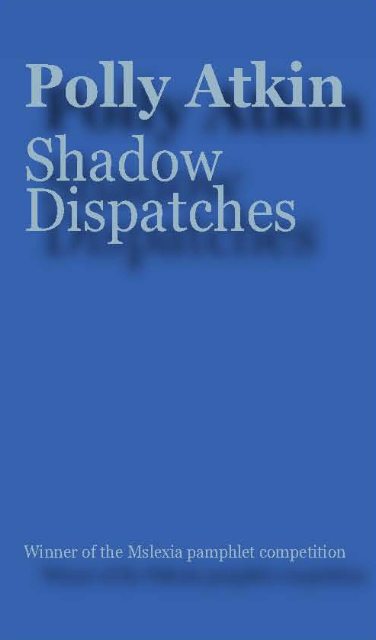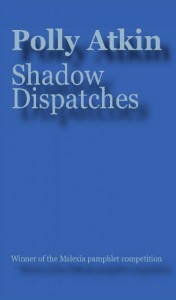Shadow Dispatches by Polly Atkin
-Reviewed by Billy Mills–
The landscape of Shadow Dispatches by Polly Atkin moves between waking and dream, the world of nature and the world of social interaction, in a set of extremely well-made poems and short sequences of thoughtful observation of both these worlds.
The opening poem, ‘This Book’, is a clever semi-collage prefaratory piece constructed from the language of book production and marketing:
I am happy to announce this book is available.
This book is available in many countries.
All the source code that goes into makingthis book is available.
This preface is followed by the key poem in the pamphlet, ‘Colony Collapse Disorder’. Taking its title from the phenomenon of the sudden disappearance of workers from beehives or colonies, the poem concerns the perceptual shift that followed the poet/narrator’s move from the city to a rural environment ‘elsewhere’. This is described as a move from a life in which one’s sense of the world is drowned by incessant buzzing to one where one becomes more fully aware, more capable of realising that ‘[l]ife is a movement/between dirt and sky.’
The poems that follow are frequently concerned with the world outside the colony, with wildlife being the dominant population, especially birds. There are poems on jays, robins, owls and a mute swan, and a heron makes a fleeting appearance. A number of the dream poems also feature members of the animal kingdom, most strikingly ‘Other People Dream of Foxes’:
Most girls make wolves into monsters. For you
it was always foxes: one more thingwe could never agree on, for all that sharing,
sprawled on our stomachs on the lawn…
The question of human relationships also runs through the pamphlet, from the friends who can’t understand the poet’s abandoning of the city through visions of childhood companionship to the moving love poem, ‘Wrecking’, in which the affection is strengthened by the lover’s acceptance of ‘quite how careless my body could be’.
The multiple themes of these poems find twin focal points in two poems dedicated to Greek gods. These are ‘Potnia Theron’ (‘our lady of the animals’, or Artemis) and ‘Hermes Enodios’ (Hermes of the roads), in which the numinous qualities of nature and movement find interesting expression. Atkin’s Artemis is seen through a glass darkly:
…your furred
Face emerging from the field of fog,
The glass between us.
Her Hermes inevitably calls to mind H.D.’s Imagist Hermes of the Ways, but where the American poet summons up the sea and great voyages, Atkin’s patron deity is, inevitably almost, a bird:
This morning, a fresh fall of feathers in the yard.
This evening, a swinging door, slamming.
Shadow Dispatches was the winning entry in the 2012 Mslexia Poetry Pamphlet competition; eight of the eighteen poems in it were either prize winners or honourable mentions in other competitions according to the acknowledgements at the back, which also mention six of the others as having been published previously in magazines. Atkin is clearly a very gifted writer, but if I had one criticism of her work as it appears here, it would be that it is almost too fine, too well made. I’d be extremely interested to see her experiment will a less tightly-controlled technique. But this is another matter; for now the work in Shadow Dispatches is what we have from her, and it’s well worth having.




